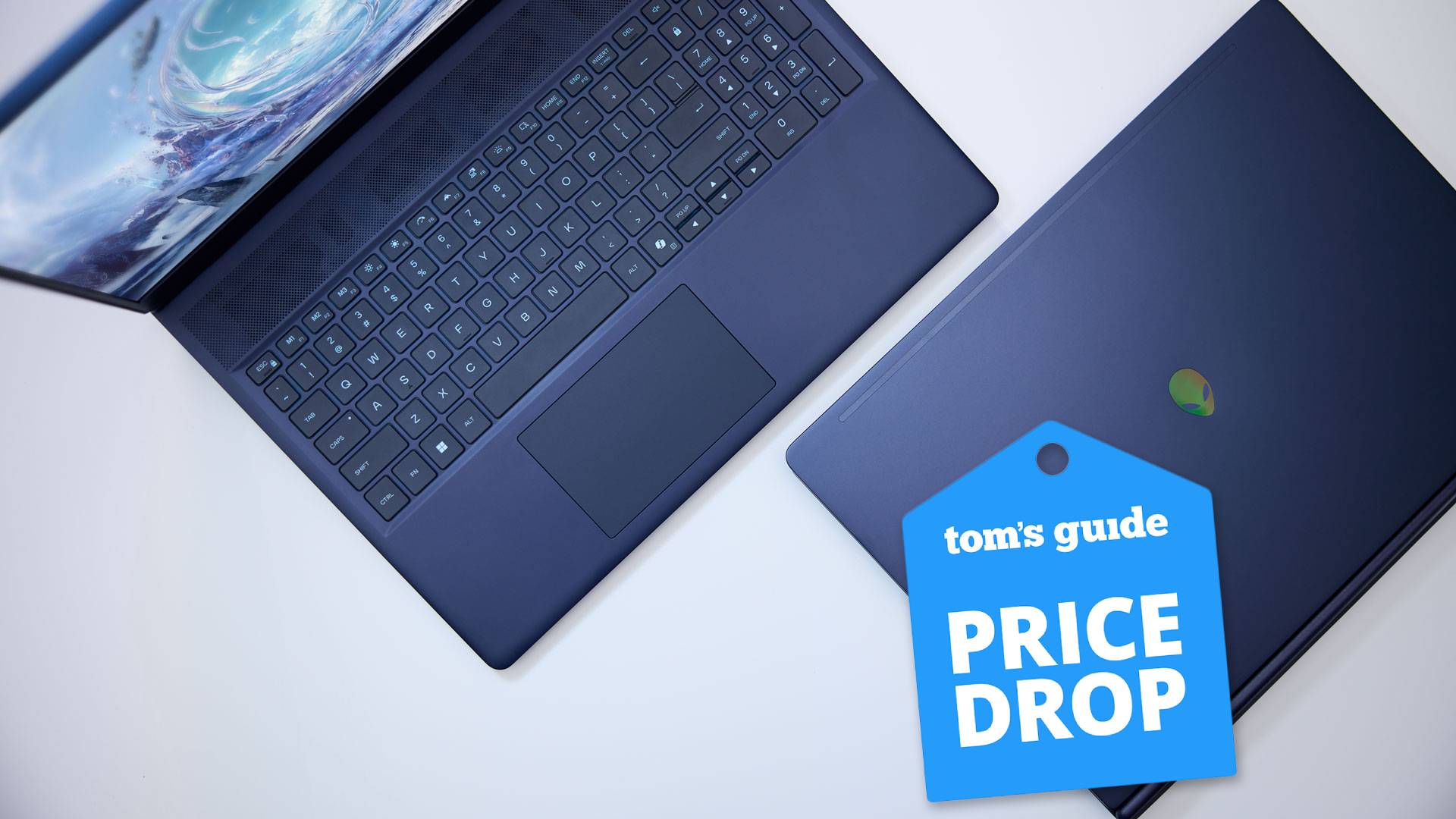Galaxy S8 vs. iPhone 7: Which Phone Is Really the Fastest?
With Samsung and Apple constantly striving to outdo each other, it's time to compare the Galaxy S8 and the iPhone 7 to see which phone is the true king of speed.
The Fight for the Fastest Phone
Over the better part of two years, Apple's homegrown mobile system-on-a-chip has typically enjoyed a pretty significant lead in performance when compared to any Android phone. But the Galaxy S8 threatens the iPhone's dominance, as the Samsung device has serious power under the hood. The company's latest flagship phone is the first to sport Qualcomm's new Snapdragon 835 chip. And that could challenge the A10 Fusion processor inside the iPhone 7 for mobile supremacy.
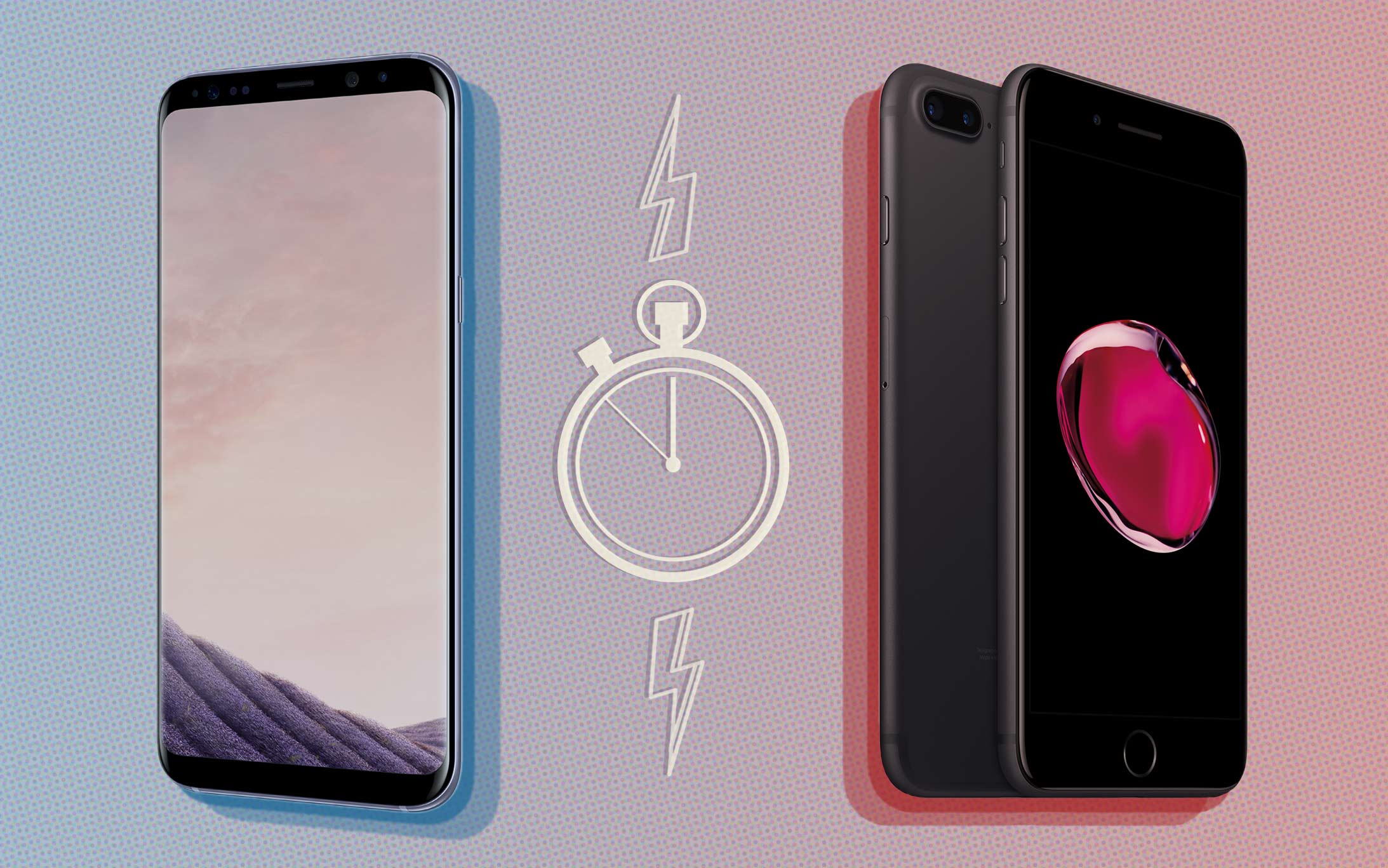
To find out which smartphone is the true performance champ, we went beyond the usual benchmarks and put each phone through a battery of real-world tests. If you who need a refresher on just what's inside either the Galaxy S8 or iPhone 7, peep at the table to see how these two phones stack up.
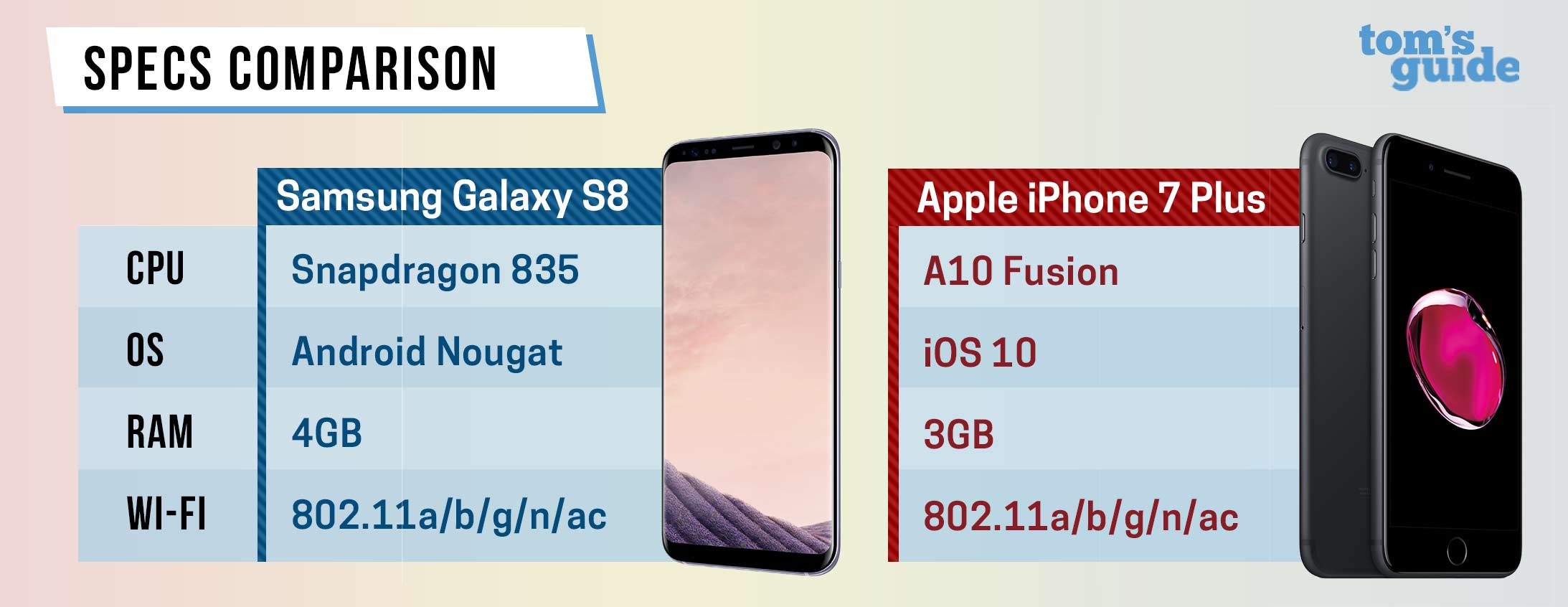
How We Test Real-World Speed
Synthetic benchmarks like Geekbench give us some idea of the performance of different phones, and so we use these tests in our phone reviews. But to really determine how the Galaxy S8 measures up to the iPhone 7, we devised the following real-world performance tests as a more thorough way to gauge which device is faster.
Test #1: App-Opening Speed
Your software experience is one of the most critical things about your phone, when you're waiting for a game to load, opening up music app before a workout or multitasking by switching among your favorite social media apps. So for this test, we picked 15 of the most popular apps and games and timed how long it took each phone to launch each program in succession. Before opening all of the apps, we connected each of phones to the same Wi-Fi network, restarted the devices and cleared out any existing background apps to ensure that nothing would interfere with the test.
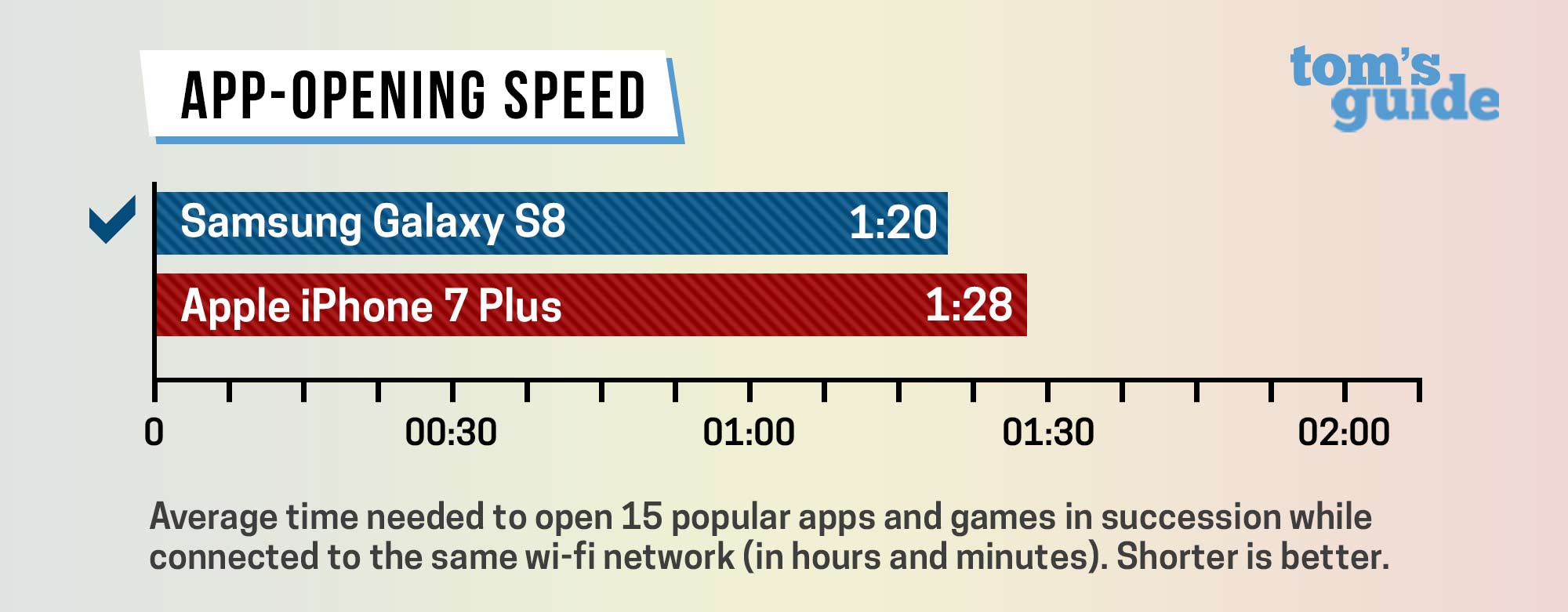
The results of this test were a bit of a surprise, because you often hear how much "snappier" iPhones feel than their Android counterparts. But in taking an average of 1 minute and 20 seconds to open all 15 apps, the Galaxy S8 finished 7 seconds faster than the iPhone 7's time of 1:28.
Admittedly, human error and reaction times could account for some of the time difference, but with a 7-second gap, the S8 is still the speedier of the two phones when opening apps.
Winner: Galaxy S8
Test #2: Video-Editing Speed
Given how easy it is to shoot video and post it up on the web with today's smartphones, we also wanted to see how well each phone handled a bit of onboard editing. On this test, we used each phone to capture a 5-minute 4K video at 30 fps, and then used the Adobe Premiere Clip and Videoshop apps to add a filter and convert the movie to a 720p version.
This round wasn't even close. The iPhone's average video-editing time of 1 minute and 28 seconds across two different apps crushed the S8's 8:13 average. While we're not entirely sure what caused such a large gap, seeing similar results across multiple video-editing apps, as we did with the iPhone, is pretty convincing.
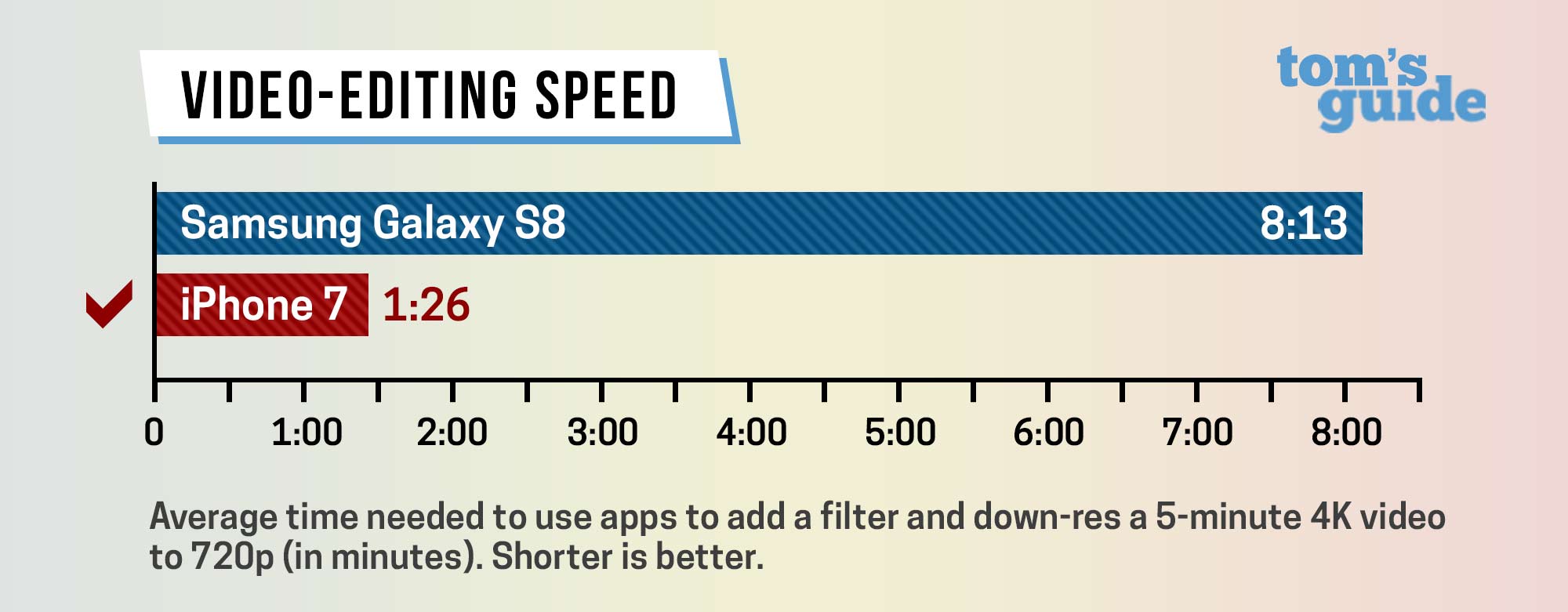
The iPhone 7 may benefit from better optimization, since app makers need to account for only a handful of devices when creating software for iOS; in the Android ecosystem, developers need to take into account hundreds of phones and tablets with various CPUs. It's possible that neither of these two apps apps has yet been optimized for the Snapdragon 835 chip.
And as we found out when we reviewed the Galaxy S8, the quad-core iPhone A10 Fusion processor gets better per-core performance than the Galaxy's octa-core Qualcomm Snapdragon 835. So if the Galaxy's chip can't use all eight of its cores to the fullest, it would be pretty much impossible for it to match the iPhone 7's performance. Either way, if you do a fair amount of mobile editing, this could be more than enough reason to choose an iPhone 7 over the S8.
Winner: iPhone 7
Test #3: Camera Open Time
There's an age-old adage that says the best camera is the one you have with you. However, your phone isn't very helpful if it takes too long to open and focus. To find out if there is a difference between the iPhone and S8 in this area, we a set up a separate camera to record at 240 fps and then timed how long it took each phone to launch open its camera app and focus on a subject
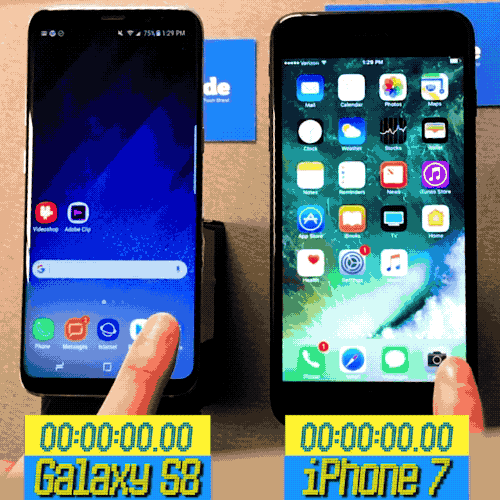
Just launching the camera app isn't enough; your phone also needs to be focused and ready to shoot. That's where the S8's dual-pixel autofocus tech really comes in handy. The S8 lags behind the iPhone 7 in simply opening the camera app, but Samsung's phone almost instantly locked onto its subject, resulting in a total open and focus time of 0.97 seconds.
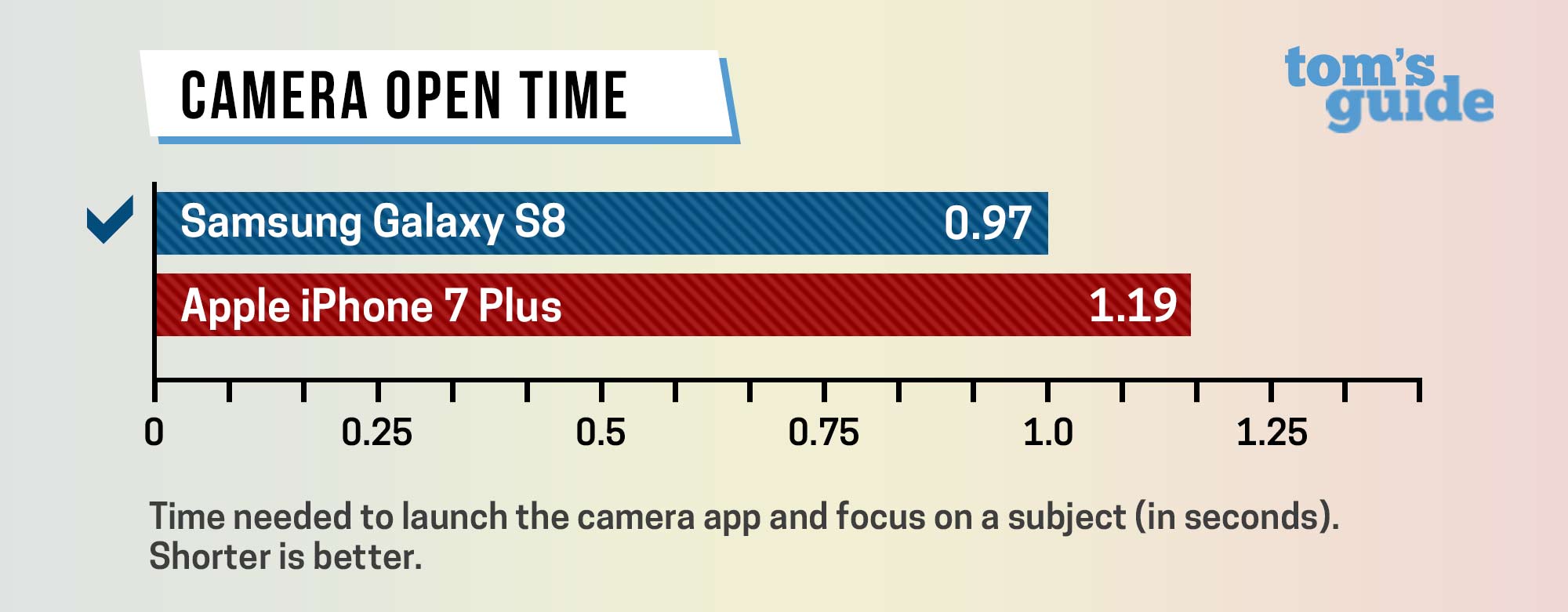
MORE: Galaxy S8 vs. iPhone 7 Camera Shootout: Samsung Has the Edge
Even though the iPhone started out ahead, its autofocus had to hunt and search to get a lock. As a result, it ended up with a slower time of 1.19 seconds to launch the app and focus on a subject. Two-tenths of a second might not sound like much, but if you're trying to snap a pic of a baby or pet, that time could be the difference between nailing a shot or missing it completely.
Winner: Galaxy S8
Test #4: Wi-Fi Speed
It's not a sexy stat, but with all the data constantly being sent to and from your phone, wireless throughput has never been more important. And while your 4G LTE speeds depend on your carrier, Wi-Fi speeds do not. So we connected the two phones to the same Wi-Fi network and used the IxChariot Wi-Fi analysis software to see how fast each device's transfer speeds could really get.
Even though both the S8 and iPhone 7 support 802.11 ac Wi-Fi, not all wireless antennas are created the same. And as some iPhone 4 users learned firsthand back in 2010, the design of a phone can greatly affect the device's reception.
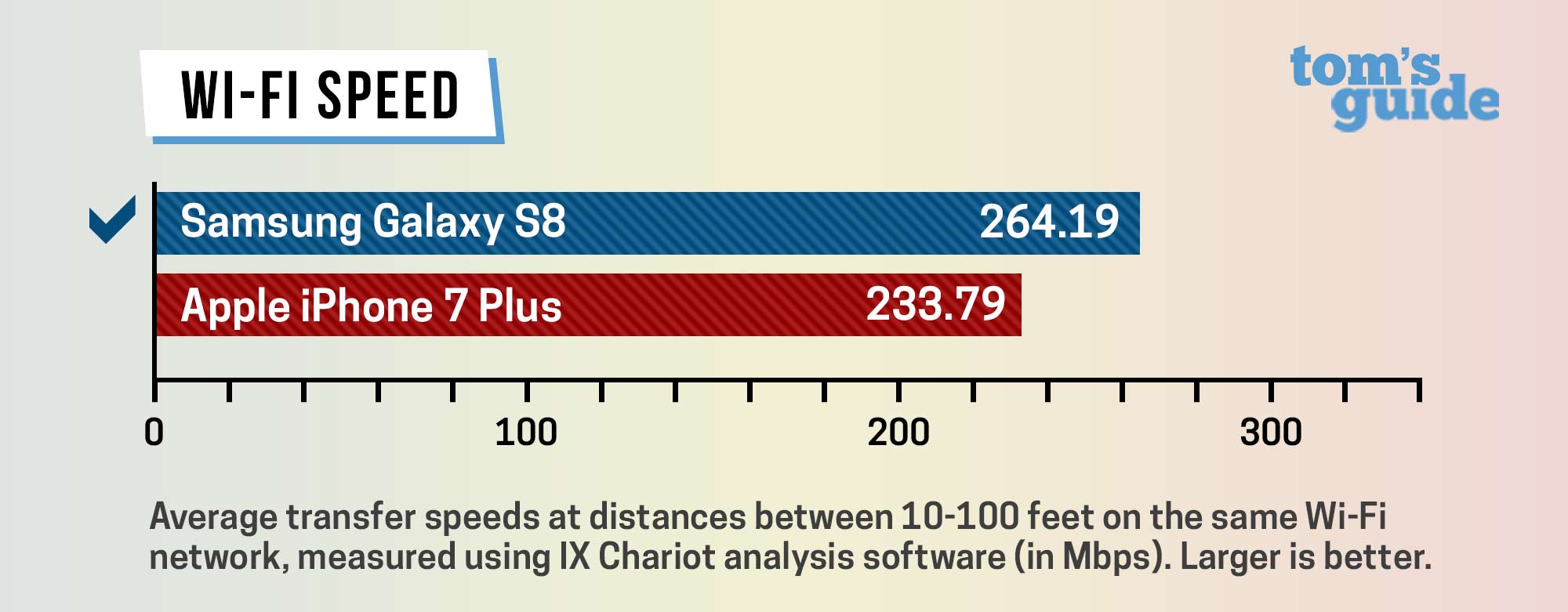
In 2017, that doesn't seem to be nearly as noticeable a problem, but with an average download speed of 264.19 Mbps across four distances, the S8 offers slightly faster overall Wi-Fi speeds than the iPhone 7 and its 233.79-Mbps average.
MORE: Top-Rated Wi-Fi Extenders to Boost Your Signal
But more importantly, the S8 showed significantly less falloff at long distances, with speeds that dropped less than 20 percent at 100 feet, versus the iPhone 7, whose speeds fell by almost 66 percent over the same distance.
| Distance from Router | Galaxy S8 | iPhone 7 |
| 10 feet | 318.23 Mbps | 351.50 Mbps |
| 30 feet | 285.88 Mbps | 266.99 Mbps |
| 50 feet | 247.88 Mbps | 196.27 Mbps |
| 100 feet | 204.75 Mbps | 120.39 Mbps |
| Average | 264.19 Mbps | 233.79 Mbps |
At 10 feet, the iPhone did display faster throughput than the Galaxy S8. But with the S8 finishing ahead at every other distance, and on the average, this round goes to Samsung.
Winner: Galaxy S8
Test #5: Gaming Performance
In 2017, everyone's a gamer of some sort. And while you might not see a difference in graphics power between two phones while playing titles like Candy Crush or Fruit Ninja, there's a vast sea of games that can bring lesser phones to their knees. To figure out if one phone has an advantage over the other while gaming, we hooked up the S8 and iPhone 7 to a PC running GameBench, which measures median FPS and frame-rate stability; we then played a few of the most demanding mobile games on the market, such as Hearthstone and CSR Racing 2.
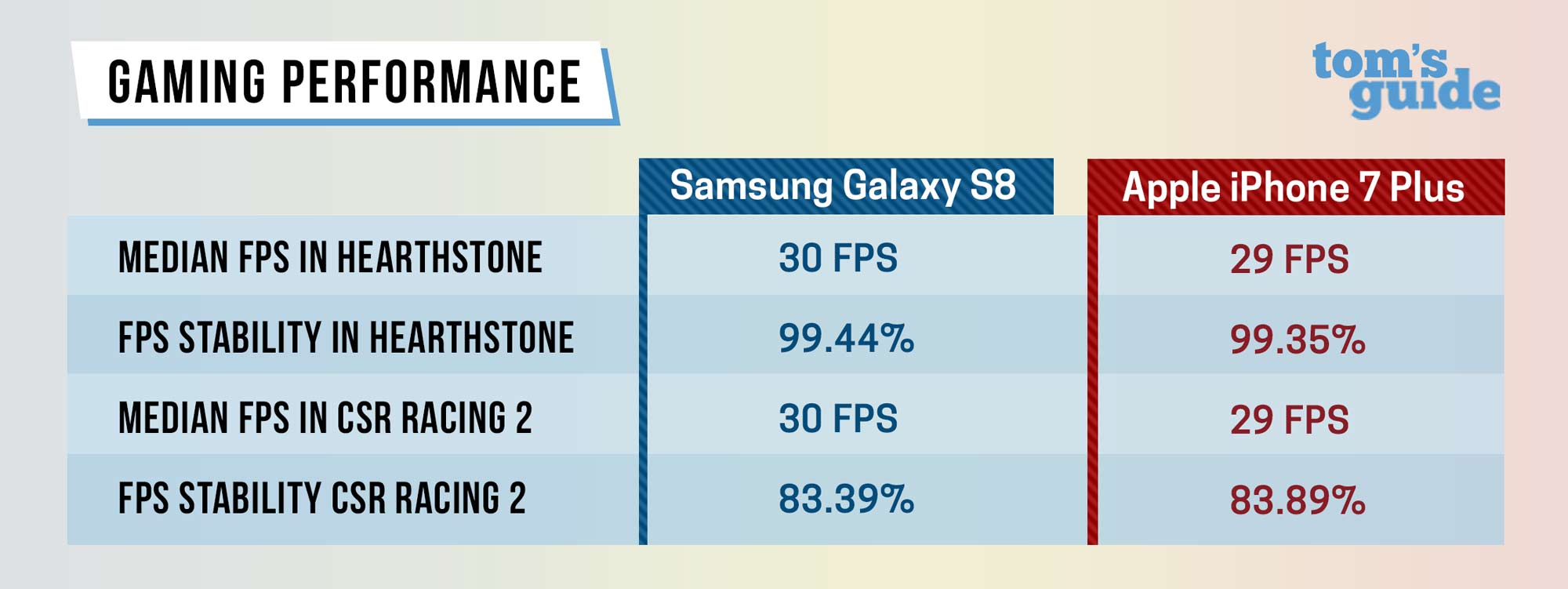
With mobile games getting more graphically demanding every day, it's more important than ever that a phone have the necessary muscle to deliver a smooth gaming experience. While many mobile games are capped at 30 or 60 fps, lower-power phones often can't hit those caps. Just as important is being able to sustain those frame rates, which is essential for a lag-free experience.
Sporting a max resolution of 2960 x 1440, the S8 starts out at a disadvantage because it has more pixels to account for than the iPhone 7 Plus, which tops out at 1920 x 1080. However, since neither of the games we tested natively supports the S8's 18.5:9 aspect ratio, the difference in resolution isn't quite as large; games on the S8 default to a more traditional 2560 x 1440 16:9 format instead.
In the mobile version of Hearthstone: Heroes of Warcraft, both phones delivered a smooth gameplay experience. The S8 produced a median frame rate of 30 fps with an FPS stability (the amount of time spent within 20 percent of the median frame rate) of 99.44 percent. The iPhone 7's metrics were essentially the same, as it recorded a median frame rate of 29 fps with an equally strong FPS stability of 99.35 percent.
You could argue that because the iPhone 7 has a stability index of 0.67 versus 1.08 for the S8 (smaller numbers are better), Apple's phone holds a slight advantage, but as the difference is so small, we think it's a bit presumptuous to declare a winner based on this stat alone.
It's also interesting to note that with CPU and GPU usage of 6.57 percent and 23.48 percent, respectively, for the Galaxy S8, versus 31.36 percent and 28.68 percent for the iPhone 7. It seems that playing Hearthstone was a slightly more taxing endeavor for Apple's device even with the two phones producing nearly identical results.
MORE: 100+ Great iOS Games for iPhones and iPads
When we played CSR Racing 2, the results were again quite similar, with the S8 hitting 30 fps versus the iPhone's 29 fps. However, the iPhone 7 pulled out to an initial lead, thanks to a higher FPS stability of 83.89 percent, compared with the S8's FPS stability of 74.52 percent. But the S8 still had an ace up its sleeve, thanks to Samsung's built-in high-performance game mode. After enabling that feature, the S8's FPS stability improved to 83.39 percent, essentially matching the iPhone's performance.
In the end, when it comes to graphics performance, instead of being held back by their hardware, both phones are actually limited by the apps themselves. When we tested less demanding games such as Super Mario Run, NBA Live Mobile and others, both phones repeatedly hit the apps' in-game FPS caps. So, even though we can't declare a winner for this category, it's nice know that these phones are so powerful that neither should have much problem keeping up with the demanding games that will be released over the next year or so.
Winner: Draw
Bottom Line
With a record of 3-1-1, we're giving the Galaxy S8 the win in this speed battle. Samsung's phone opened apps faster, was ready to shoot photos quicker and delivered zippier Wi-Fi speeds. However, in each of the S8's three victories, it's important to point out how close the iPhone 7 was to Samsung's phone, as opposed to the absolute thrashing the iPhone 7 delivered to the S8 in our video-editing tests.
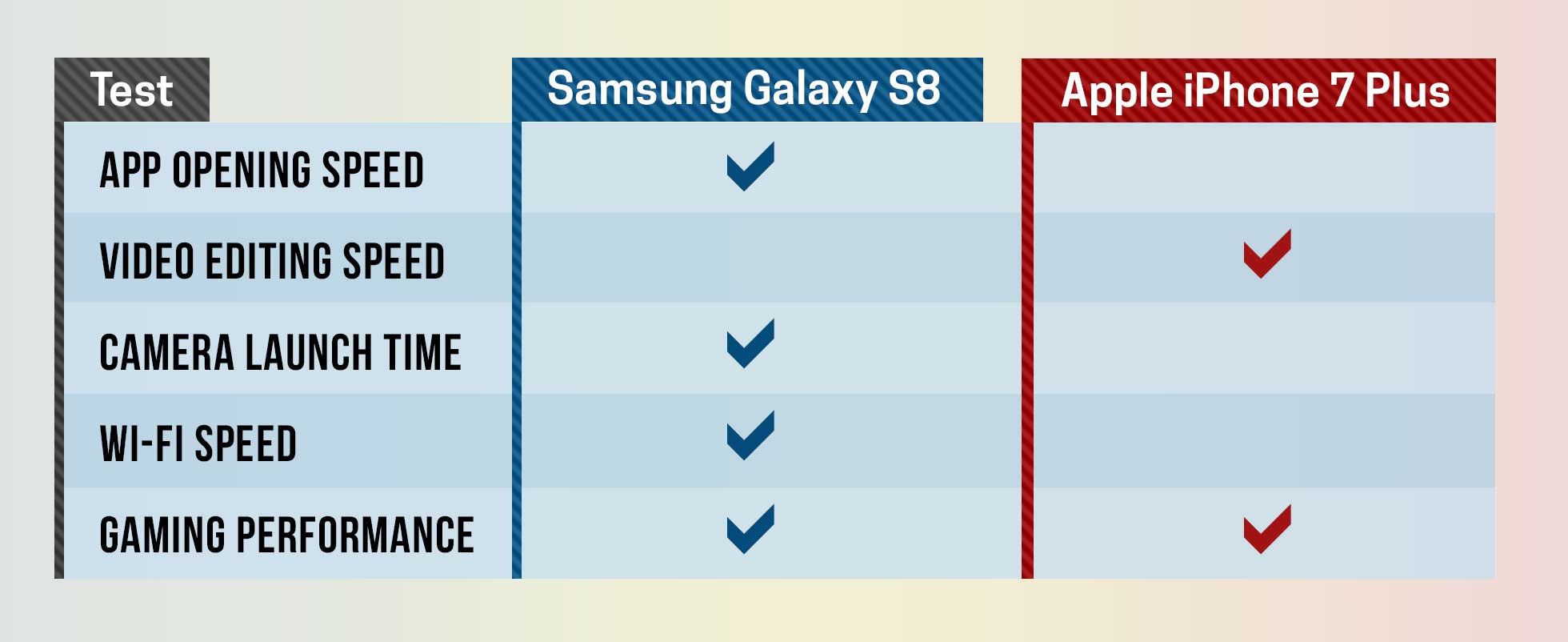
If you've been wondering whether Apple or Samsung makes the faster phone, you now have an answer: It's the Galaxy S8.
Illustrations: Tom's Guide
Get instant access to breaking news, the hottest reviews, great deals and helpful tips.
Sam is a Senior Writer at Engadget and previously worked at Gizmodo as a Senior Reporter. Before that, he worked at Tom's Guide and Laptop Mag as a Staff Writer and Senior Product Review Analyst, overseeing benchmarks and testing for countless product reviews. He was also an archery instructor and a penguin trainer too (really).
-
Risto_1 Gaming performance really needs a new review with a game that doesn't have 30 FPS limit.Reply
If those FPS results are real (and not capped like I think they are), I guess it's safe to declare S8 as the winner, as 2560x1440 has 1.78 times the pixel count than 1920*1080, therefore S8 being almost double as powerfull than iPhone 7 in gaming.
No doubt the video editing speed difference is caused by lack of optimizations by app developers on Android platform, but nevertheless the difference is real and a valid reason for some people to pick iPhone 7 instead of S8. -
MoiSoto I would buy the Samsung S8+ because the screen and camera, not because is 1% speedier.Reply
I'm an Apple user, but frankly, the iPhone 7 Plus is a 3-years old design and compared to the S8 it just looks ridicule. That being said, I don't see much of a point in comparing the S8+ with a device that was launched last year. I'm actually surprised to see how well the iPhone holds up in regards to performance.
I look forward for a similar showdown when the 2017 Apple Handset is released. This article is actually way better than other comparison videos I've seen. Just think the comparison is not too relevant as the S8 destroys the iPhone 7 design wise and Apple's comparable device hasn't launched yet. -
Ozzy_2 The iPhone 7 Plus is last years model. I wonder how the S8 will fair versus this years.Reply -
Kyle Tweil This is totally not a legit test at all. I have both devices on my hand, and some app is faster on Samsung but after opening up multiple apps and closing those, it turns out that iphone is faster.Reply -
tk47 I don't get it in YouTube videos, in app opening iPhone 7 beats Samsung Galaxy s8. Is it because those a different set of apps? ( I really want to know what are the apps he used in the comparison)Reply
Here is one video link: https://www.youtube.com/watch?v=pn-2B82B1mg
about the camera app I wonder if you download the google camera app on the galaxy, which one would launch faster? -
Jetcat3 Just used a Galaxy S8 for two weeks and I can confidently say that the iPhone 7 Plus is a much faster feeling phone overall. It's quite obvious to me.Reply -
Tom_234 IPhone uses the smaller cores to open simple apps...it will turn on the big cores when you have demanding apps opening, such as demanding games or video editing apps.Reply
Games need to test at 60 fps to test the limits of GPU. Not 30. -
Juan_61 I had an iphone 7 plus and now i have a samsung s8 and this phone hardware wise kills the iphone, now the iphone software and apps optimization is still a bit better on the iphone. but the screen on the s8 is just crazy nice and built is just awesome and how you can fit all that tech on a such a small footprint phone hell this phone has a bigger screen than the iphone 7 plus and the s8 is way smaller thats incredible engineering by samsung.Reply -
Tom_234 Reply19724827 said:I had an iphone 7 plus and now i have a samsung s8 and this phone hardware wise kills the iphone, now the iphone software and apps optimization is still a bit better on the iphone. but the screen on the s8 is just crazy nice and built is just awesome and how you can fit all that tech on a such a small footprint phone hell this phone has a bigger screen than the iphone 7 plus and the s8 is way smaller thats incredible engineering by samsung.
Good luck with your S8. From what i have read, after a few months, your s8 will slow down to a turtle and need factory reset. Hardware on S8 kills alright...look at that fingerprint reader placement! Check out the PLASTIC fingerprint reader. Yes, plastic.
